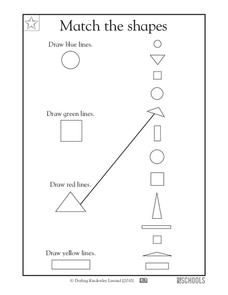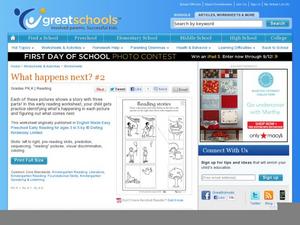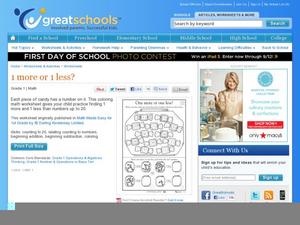Curated OER
Match the Shapes
Match the shapes! There are multiple potential objectives here as young scholars match shapes using different colored lines. There are four starter shapes and learners draw lines connecting them to matching shapes from a larger group....
Curated OER
Missing Letters
There are multiple objectives to be met in this phonics worksheet. Each of these six CVC words is missing a first letter: can your scholars figure out what it is? Spellers complete the word along with its rhyming partner, drawing a...
Curated OER
Match the Words
As early readers begin recognizing simple words, give them practice with exercises like this matching worksheet. For each word, learners examine three options to determine which is the same. They draw a line from the starting word to its...
Curated OER
Missing Letters: -oat, -ell, and -all
Beginning readers must solve for the missing letter in these spelling questions. There are three pairs of rhyming words here, each without an initial letter. They complete the word, and for the second box, draw a picture. The alphabet is...
Curated OER
Missing Letters
Take advantage of multiple objectives in this phonics instructional activity. Each of these single-syllable words is missing a first letter. Spellers complete the word along with its rhyming partner, drawing a picture of the second word....
Curated OER
What Happens Next: 2
What happens next? That is a great question that requires learners to think about the sequence of events then make a prediction. They assess the pictures on the left and draw lines to the pictures on the right that show what will happen...
Curated OER
One More or One Less?
Hook new mathematicians with a candy-themed approach to addition and subtraction. They examine 10 numbers (not exceeding 19) printed on candy wrappers. For each, learners calculate and record numbers with values one more and one...
Curated OER
Money
Which coins do you need? Scholars are faced with a challenge: using only three coins they must find the exact amount needed for six items. The coins are standard US currency and are pictured at the top, however their value is not listed....
Curated OER
Counting by 3s, 4s, and 5s
Skip count along the mushrooms to complete these number sentences which give young scholars an introductory look at addition and subtraction. Starting from five double-digit numbers, they subtract or add by threes, fours, and fives to...
DK Publishing
3 Fewer Than
How fun! Beginning counters practice with subtraction concepts as they draw apples onto trees and focus on the term fewer. The first tree pictured here has nine apples, and they count and record the number. On the next tree (which...
DK Publishing
Learning 13 and 14 - Write the Numbers
Focus on the numbers 13 and 14 with beginning counters. They start by tracing each numeral, then printing them once on their own. Next, learners count sets of candy and record the totals. They also draw two of their own sets, one of 13...
DK Publishing
Number Sentences Multiplying by 3
How many sets of eggs? Approach multiplication through sets of, in this case, three objects. Learners fill in blanks to complete a number sentence in two forms: ___ sets of 3= ___ and ___ x ___ = ___. There is an example they can...
DK Publishing
Number Sentences: Multiplying by 4
If your third graders have a hard time visualizing multiplication, use this worksheet to help them see the math. Pictures of hands, eggs, and houses, among others, illustrate different multiplication equations, all of which involve...
Curated OER
Time
Three time-telling activities help scholars comprehend analog clocks on the hour. First, they write in the time displayed on three clock faces. Beginners to this concept only write in digits, as the o'clock is already...
Curated OER
Mixed Tables
How many pennies does each person get? There are four visual division problems for young mathematicians to solve, and they divide 12 pennies among a set of people for each. They draw the coins above each recipient and then write the...
DK Publishing
Small, Smaller, Smallest
Cupcakes, ice cream, and lemonade - what a delicious way to practice measurement! Kindergartners view drawings of treats and draw smaller versions. They also choose the smallest picture out of a group. For extra fun and practice, bring...
DK Publishing
Using the 2 Times Tables
If your third graders have a hard time with multiplication, visualizing the problems might help. Six problems show learners how to count pairs of boxes to solve multiplication with the two times table. At the end, they draw boxes to...
Curated OER
Who Has More Money?
Coloring and money combine in this fun instructional activity! First and second graders count the amounts of money represented in each, and then color the person or animal who has the most money. They then draw the correct coins to add...
Curated OER
Animal Homes
Match animals to their environments with a cute lab activity. Kids draw a line between each animal, such as a fish, a rabbit, and an ant, to the place where it lives. For hands-on practice, a science investigation instructs learners to...
Curated OER
Can You Make a Muscle?
Why are muscles important? Third graders study the different kinds and functions of muscles in the human body. After drawing arrows in an illustration to indicate where a muscle contraction would occur, they do their own experiment about...
Curated OER
Circuit Diagrams: Switching Circuits
Use a lab sheet on circuit diagrams in your electricity unit. Fifth graders draw two series circuits with diagrams, based on two examples. A science experiment prompts learners to use 3x5 cards to illustrate the way a series circuit works.
Curated OER
How Does Water Cool?
How fast does water cool? First fifth graders will draw a line on a graph that predicts how fast they think water can cool from boiling. Then they plot the actual data on the same graph to see if their estimate was correct.
Shmoop
ELA.CCSS.ELA-Literacy.RL.9-10.9
As the saying goes: there are no new stories. Standard 9 for reading literature in the Common Core addresses this fact and requires that students be able to analyze how authors use the themes, stories, and characters of earlier works....
Illustrative Mathematics
How Many _______ Are In. . . ?
Help your learners gain meaningful understanding of dividing fractions using fraction models. The activity includes nine problems which are sequenced to show how the fraction division algorithm evolves. Have students use graph paper or...
Other popular searches
- Scale Drawings
- Grid Drawings
- Isometric Drawings
- Drawings Weather Instruments
- Mitosis Drawings
- Construct Scale Drawings
- Rube Goldberg Drawings
- Cad Drawings
- Chalk Drawings
- Figure Drawings
- Flower Drawings
- Math Vocabulary Drawings























